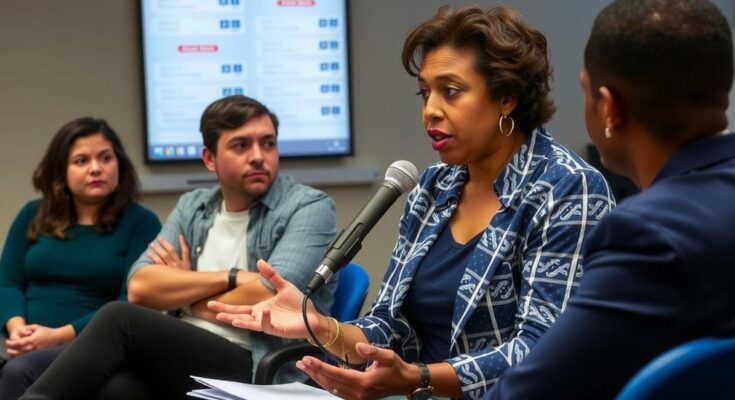Stacey Abrams hosted a post-election dialogue at Howard University, encouraging students to reflect on their roles in shaping democracy. She addressed misinformation, the threat of Christian nationalism, and the political challenges facing Black women. Abrams emphasized the necessity of coalition-building and active civic engagement, urging students to harness their strengths leading into future elections.
On November 20, Stacey Abrams, Howard University’s inaugural Ronald W. Walters Endowed Chair for Race and Black Politics, led an engaging event in Douglass Hall designed to enable students to discuss the implications of the recent presidential elections. With a deft blend of insightful commentary and student interactions, Abrams facilitated a vital conversation focused not only on the election outcomes but also on future prospects and responsibilities of young voters in shaping democracy.
The dialogue revolved around critical pressing issues such as misinformation in electoral politics and the potential encroachment of theocracy into American governance. Abrams warned against the evolving threat of Christian nationalism, outlining how legislative measures, such as those promoting biblical teachings in schools, could gradually shift American identity towards a theocratic model. “It’s the intent to shift America… to making Christianity a central pillar [of government],” explained Abrams. In light of ongoing political shifts, she emphasized the need for vigilance among citizens, particularly highlighting the critical role of Black communities in promoting and protecting secularism in politics.
Furthermore, Abrams discussed the potential regressive impacts of political maneuvers targeting established rights, notably the dismantling of Roe v. Wade and potential threats to diversity, equity, and inclusion initiatives. She articulated that these efforts are often subtle yet effective, warning, “…the death is just as real so we’ve got to start paying attention to the smaller pieces.” Her powerful call to action underscored the obligation of citizens to engage actively in political processes to avert further erosions of civil rights.
The conversation touched on the unique challenges faced by Black women in the political realm. Abrams articulated the exhaustion felt by this demographic, particularly in light of their significant support for Vice President Kamala Harris’s candidacy. She acknowledged this struggle, yet encouraged resilience and solidarity with diverse groups, stating, “Black women are usually the most effective fighters… but we understand more than anyone what the consequences of inaction feels like.”
Abrams further addressed the strategic importance of coalition-building in advancing social justice. She called upon students to transcend the limitations posed by narrow ideological views, arguing, “Our conversation has to be that shared destiny requires shared investment.” This collective approach, according to Abrams, could empower underrepresented communities in America.
In a culmination of her insights, Abrams advised students to harness their unique generational strengths in political advocacy. She urged them to engage actively with their communities, stressing the importance of civic participation and political education, particularly leading up to the 2026 midterm elections. Through strategic involvement—be it through dialogue, community service, or attending local government meetings—Abrams posited that citizens could reclaim agency in shaping their political landscape.
The article discusses a recent event hosted by Stacey Abrams, a prominent political figure and advocate for racial justice, following the 2024 presidential election. As the inaugural Ronald W. Walters Endowed Chair, Abrams gathered students to engage in a constructive dialogue about the outcomes of the election and the responsibilities that lie ahead in terms of political engagement and advocacy, particularly addressing key issues such as misinformation, political rights, and the importance of solidarity across diverse demographics.
In summary, Stacey Abrams’ post-election dialogue with Howard University students offered a multifaceted examination of the current political landscape, emphasizing issues such as Christian nationalism, the vulnerability of established rights, and the importance of coalition-building. By encouraging active civic engagement, Abrams inspired students to take on leadership roles in addressing societal challenges, fostering a sense of responsibility and agency within the student body as they navigate the complexities of contemporary American politics.
Original Source: newsroom.howard.edu




